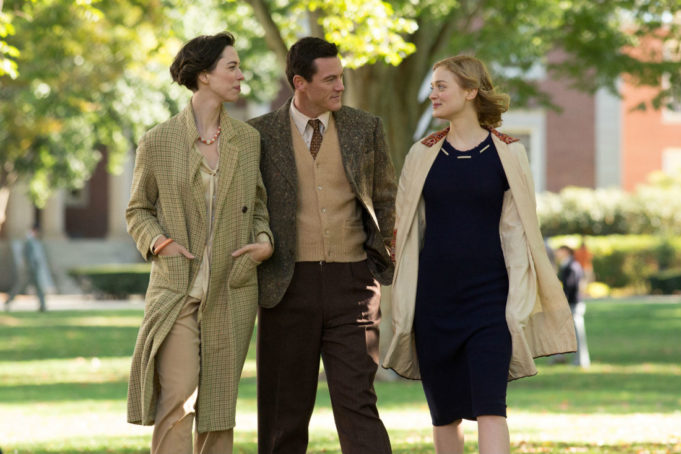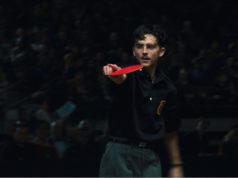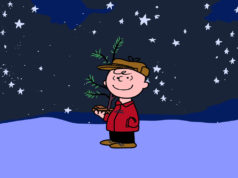Sometimes, a high-profile film is followed by a movie on a related subject intended to capitalize on the first movie’s expected success. (Remember 12 years ago, when we had two films about Truman Capote?) Professor Marston and the Wonder Women trails in the wake of Wonder Woman, but it doesn’t play like a tag-along. Rather, it seems an essential companion movie giving insight into the comic book’s creator, though some parents will undoubtedly blanch at the lesbian sex and S&M practices that went into the superheroine that they took their 9-year-old daughters to see.
The movie picks up in 1945, as William Moulton Marston (Luke Evans) testifies in front of a group of bluenoses calling themselves the Child Study Association, which have condemned his Wonder Woman comics for their violence, scantily clad heroine, and bondage imagery. As he explains and defends his methodology, we get the main story in flashback, when he’s a Harvard-trained psychology professor at the all-female Radcliffe University, while his English-born wife Elizabeth (Rebecca Hall) helps with his experiments and gripes that her psych degree doesn’t say Harvard on it when all her classes were there. Fatefully entering their lives in 1925 is Olive Byrne (Bella Heathcote), a beautiful graduate student who’s entranced by both of them. She turns out to be a missing element in both Bill and Elizabeth’s lives, and while their ménage à trois situation gets the Marstons fired from Radcliffe and necessitates that the three of them spin a web of lies to keep their relationship secret, it also leads to the creation of the most popular heroine in comic-book history.
This is by Angela Robinson, the openly gay writer-director who worked extensively on TV’s The L Word but helmed a few films before then. Despite some issues with pacing, this is her best work by some distance, and I’ll admit, better work than I thought her capable of. Many of the biographical details here are taken from Jill Lepore’s extensively researched 2014 book The Secret History of Wonder Woman. Robinson does give short shrift to the role that Elizabeth Marston played in Wonder Woman’s genesis (it was her idea that her husband write a female superhero) and also to Byrne’s pseudonymous career as a journalist who advocated subversive and radical feminist ideas in women’s magazines.
Even so, Robinson places the emotional weight of this story on the women, as the determined feminist Elizabeth is nevertheless also the one who’s most mindful of the outside world’s disapproval. She’s the one who sends a heartbroken Olive away when their kids get beaten up, and she’s the one who has to take her back so everybody can be whole again. This is easily the best role that the Australian Heathcote has ever had, and Hall is even better as a woman whose easy confidence betrays someone who’s not yet in touch with all her sexual desires. Filmmakers have seemed flummoxed how to use this tall, forcefully intelligent British-American actress, but maybe this movie will give them a clue.
Even more enlightening is the way the movie links the trio’s S&M practices to the mythology of Wonder Woman. Those early comics often depicted either her or her foes being tied up or otherwise restrained. Her outfit was inspired by a bustier that Byrne was photographed wearing, and her bullet-deflecting bracelets had the same design as Byrne’s own jewelry. And where do you think that golden lasso that compels people to tell the truth comes from? (The movie also shows the Marstons inventing a key component of the lie detector.) Professor Marston and the Wonder Women gives a remarkable insight into both the comic heroine and the particular variant of sexuality that gave rise to her; indeed it’s a far better BDSM film than those lame Fifty Shades movies. Even if you have no interest in Wonder Woman or bondage sex, this film is an entrancing glimpse of the odd forms that love can take.
Professor Marston and the Wonder Women
Starring Luke Evans, Rebecca Hall, and Bella Heathcote. Written and directed by Angela Robinson. Rated R.












